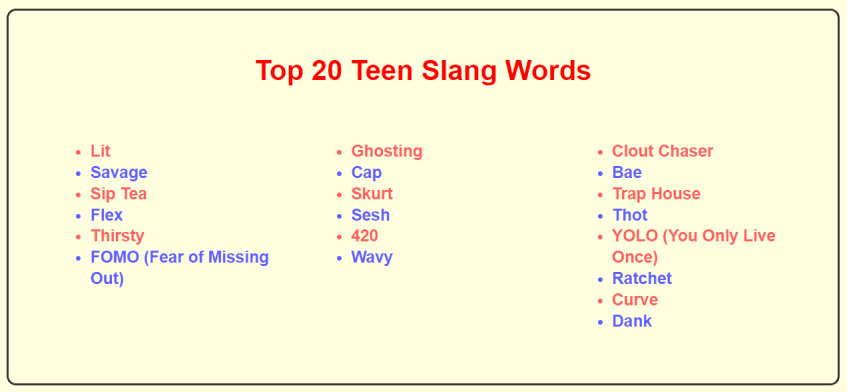Sic/sick Meaning
Sic/sick means cool or excellent.
Sic/sick is an internet slang expression that is used as an adjective to compliment someone or something.
How Is Sic/sick Used? Use Cases & Examples
Sic/sick now means particularly cool or trendy, a meaning that is becoming more and more popular among young people. When teens say something is really sick, they are describing something they think is awesome. Similar slang expressions are dope and fire.
Examples of how your teen might use the slang term Sic/sick:
- That’s a sic car.
- This image is sic.
- This is a sic mosh pit.
- The band last night was sic.
How to Identify If Your Kids Are Using the Sic/sick Slang Word
The slang term Sic/sick is harmless, but risky slang words can appear in your children’s digital activities. Paying attention to the slang words children use is a very important task for every parent. To keep kids safe from potential threats, check these two ways to detect the Sic/sick slang word:
1. Check Their Phones Directly for the Sic/sick Slang Word
If your kids have used the Sic/sick slang word, you can find out by checking their phones. All you need to check is their text messages, search history, and social chats on WhatsApp, Line, Facebook, Skype, etc.
Cons:
- Affect your relationship with your kids
- Troublesome
- Can’t detect dangers timely
Pros:
- No need to install any app
2. Install A Parental Control App to Monitor the Sic/sick Slang Word
Put a parental control app on your kids’ phones to detect dangerous slang words. The app allows you to monitor teenage slang like Sic/sick in their text messages, search history, and chat messages. Also, it sends emails to you when specific slang words are triggered. Therefore, you will be able to take measures to protect your family.
Pros:
- More features like chat monitoring, GPS tracking, call recording, surrounding recording, etc
- Instant alerts
- Easy to install and use
Cons:
- Some apps are not free
Parental Control Apps to Detect the Sic/sick Slang Word
Android:
- Google Family link:
It is a family parental control service from Google that helps you check search history for the Sic/sick slang word, restrict content, set screen time, and more. - iKeyMonitor:
iKeyMonitor is one of the most powerful parental control apps. It monitors SMS, chat messages, and searched terms on kids’ phones. It will take screenshots/photos and send instant alerts to you on triggered alert words such as Sic/sick. Besides, it will record calls, surroundings and block inappropriate apps to protect your kids from threats.
iOS:
- Apple Screen Time:
With Apple’s built-in parental control setting, you can manage app limits, set content restrictions, and more. Just unlock the iPhone or iPad, then go to Settings and tap on Screen Time. - Norton Family Parental Control:
Norton Family provides insights that help you foster a healthy online/offline balance for your children and their devices. - Kaspersky Safe Kids with GPS:
Kaspersky Safe Kids is a popular parental control app that provides web monitoring, app blocking, filtering, and more. - Alertbird Parental Control:
Alertbird is a parental control app for iOS that monitors the Sic/sick slang term and other dangerous words. You will be notified immediately if it detects alert keywords in your searched terms and chat messages, such as the Sic/sick slang word.
Tips to Talk With Your Kids About the Use of the Sic/sick Slang Word
One of the interesting features of teenage slang expressions is that sometimes the terms have the opposite meaning to their traditional meaning. That’s the case with the teenage slang term Sic/sick, the quirkiness that provides you with a springboard to talk to your kids about slang they use a lot. Here are some ideas for having a conversation with your teens about slang terms that mean the opposite:
- How do you think sick/sic is used as a way to show that something is cool?
- Have you ever said bomb or killer to describe something really nice?
- Is there any difference in meaning between sick and dope?
- What’s your favorite slang term that’s the opposite of what it originally meant?
